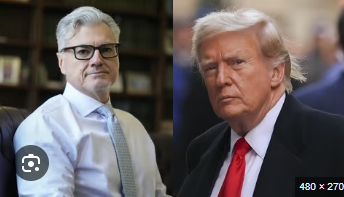NEW DELHI, Jan 9: The American President-elect Donald Trump was formally sentenced on Friday in his hush money case, but the judge declined to impose any punishment. The outcome cements Mr Trump’s conviction while freeing him to return to the White House unencumbered by the threat of a jail term or a fine.
Mr Trump’s sentence of an unconditional discharge caps a norm-smashing case that saw the former and future President charged with 34 felonies, put on trial for almost two months and convicted on every count. Yet, the legal detour — and sordid details aired in court of a plot to bury affair allegations — didn’t hurt him with voters, who elected him to a second term.
Manhattan Judge Juan M. Merchan could have sentenced the 78-year-old Republican to up to four years in prison. Instead, he chose a sentence that sidestepped thorny constitutional issues by effectively ending the case but assured that Trump will become the first person convicted of a felony to assume the presidency.
The hush money case accused Mr Trump of fudging his business’ records to veil a $130,000 payoff to porn actor Stormy Daniels. She was paid, late in Mr Trump’s 2016 campaign, not to tell the public about a sexual encounter she maintains the two had a decade earlier. He says nothing sexual happened between them, and he contends that his political adversaries spun up a bogus prosecution to try to damage him. “I never falsified business records. It is a fake, made up charge,” the Republican president-elect wrote on his Truth Social platform last week. Manhattan District Attorney Alvin Bragg, whose office brought the charges, is a Democrat.
Mr Bragg’s office said in a court filing on January 6, 2025 that Mr Trump committed “serious offences that caused extensive harm to the sanctity of the electoral process and to the integrity of New York’s financial marketplace.”
While the specific charges were about checks and ledgers, the underlying accusations were seamy and deeply entangled with Mr Trump’s political rise. Prosecutors said Daniels was paid off – through Mr Trump’s personal attorney at the time, Michael Cohen – as part of a wider effort to keep voters from hearing about Mr Trump’s alleged extramarital escapades.
Mr Trump denies the alleged encounters occurred. His lawyers said he wanted to squelch the stories to protect his family, not his campaign. And while prosecutors said Cohen’s reimbursements for paying Daniels were deceptively logged as legal expenses, Mr Trump says that’s simply what they were. “There was nothing else it could have been called,” he wrote on Truth Social last week, adding, “I was hiding nothing.”
Mr Trump’s lawyers tried unsuccessfully to forestall a trial. Since his May conviction on 34 counts of falsifying business records, they have pulled virtually every legal lever within reach to try to get the conviction overturned, the case dismissed or at least the sentencing postponed.
They have made various arguments to Merchan, New York appeals judges, and federal courts including the Supreme Court. The Trump attorneys have leaned heavily into assertions of presidential immunity from prosecution, and they got a boost in July from a Supreme Court decision that affords former commanders-in-chief considerable immunity.
Mr Trump was a private citizen and presidential candidate when Daniels was paid in 2016. He was president when the reimbursements to Cohen were made and recorded the following year. On one hand, Mr Trump’s defence argued that immunity should have kept jurors from hearing some evidence, such as testimony about some of his conversations with then-White House communications director Hope Hicks.
And after Mr Trump won this past November’s election, his lawyers argued that the case had to be scrapped to avoid impinging on his upcoming presidency and his transition to the Oval Office.
Merchan, a Democrat, repeatedly postponed the sentencing, initially set for July. But last week, he set Friday’s date, citing a need for “finality.” He wrote that he strove to balance Mr Trump’s need to govern, the Supreme Court’s immunity ruling, the respect due a jury verdict and the public’s expectation that “no one is above the law.” Mr Trump’s lawyers then launched a flurry of last-minute efforts to block the sentencing. Their last hope vanished Thursday night with a 5-4 Supreme Court ruling that declined to delay the sentencing.
Meanwhile, the other criminal cases that once loomed over Mr Trump have ended or stalled ahead of trial. After Mr Trump’s election, special counsel Jack Smith closed out the federal prosecutions over Mr Trump’s handling of classified documents and his efforts to overturn his 2020 election loss to Democrat Joe Biden. A state-level Georgia election interference case is locked in uncertainty after prosecutor Fani Willis was removed from it.
(Manas Dasgupta)

